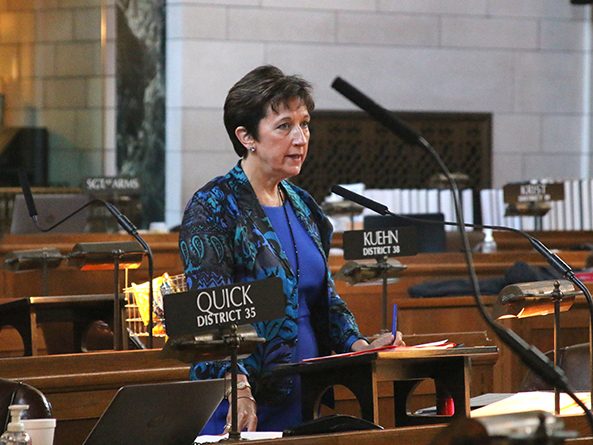Stronger human trafficking penalties clarified, advanced
Lawmakers amended and advanced a bill from select file May 5 that would address the rise in human trafficking in the state.

LB289, introduced by Lincoln Sen. Patty Pansing Brooks, would increase penalties for a number of crimes, including pandering and human trafficking for labor or sexual exploitation.
Under the bill as introduced, the penalties for pandering or trafficking of an adult would increase from a Class III to a Class II felony, punishable by 1 to 50 years in prison.
The bill would impose even stronger penalties for sex trafficking offenses involving a minor. Previously a Class II felony, sex trafficking or solicitation of a minor would be categorized as a Class IC felony, punishable by 5 to 50 years in prison.
Finally, the bill would designate solicitation of a trafficked adult as a Class II felony, which could result in 1 to 50 years in prison.
Pansing Brooks introduced an amendment on select file, adopted 38-0, that eliminated from the bill separate penalties for the threat or use of force in cases of trafficking. It also raised the classification of sex trafficking or solicitation of a minor from a Class IC felony to a Class IB felony, punishable by a minimum of 20 years in prison to life imprisonment.
The amendment also eliminated the proposed Class II felony charge for solicitation of a trafficked adult, instead incorporating “solicitation” under the definition of sex trafficking.
Pansing Brooks said the amendment addressed concerns raised during general file debate that the bill was too broad in scope and could unintentionally criminalize people engaged in legal activity like patronizing a strip club.
The bill had been amended on general file to include provisions of LB394, originally introduced by Lincoln Sen. Adam Morfeld. These would prohibit any person under a valid domestic violence protection order, or who knowingly violates a valid harassment protection order, from possessing a deadly weapon.
Morfeld introduced an amendment on select file, adopted 30-1, to remove these provisions from LB289, saying there could be unintended consequences to the bill that needed further study.
Provisions of three additional bills dealing with sexual assault and domestic violence were incorporated into LB289 on general file.
The first was LB191, originally introduced by Pansing Brooks, would prohibit the withdrawal of a petition for a protection order except upon order of the court. A victim of domestic abuse could file a petition and affidavit to renew a protection order up to 30 days before the expiration of the previous order to ensure there is no gap in protection. A renewed order would be effective for a period of one year, commencing on the first day following expiration of the previous order.
Provisions of LB178, originally introduced by Lincoln Sen. Kate Bolz, would allow a victim of sexual assault to file for civil protection orders against the perpetrator. The order would prohibit a perpetrator from contacting or communicating with the victim.
Provisions of LB188, originally introduced by Omaha Sen. Sara Howard, would allow for the parent of a child conceived as a result of a sexual assault to petition for termination of parental rights of the perpetrator.
The bill was advanced to final reading by voice vote.


